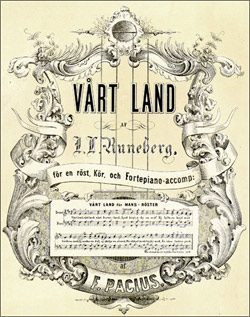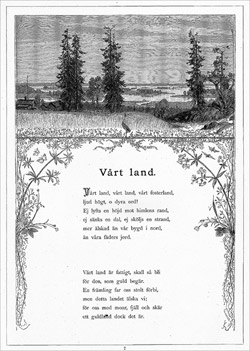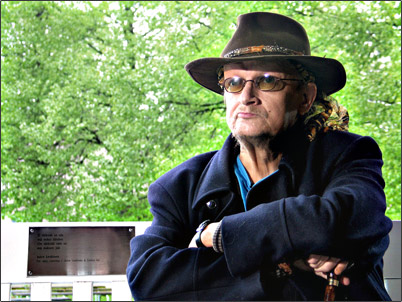Vårt Land is a setting of a poem by Runeberg, written in 1846. The poem was later published in The Tales of Ensign Stål. Pacius set the poem to music in the spring of 1848 and, according to tradition, he wrote the music in four days. The first performance of the song took place on 13 May, during a celebration on Flora’s Day in the Kumtähti Field in Helsinki.

Cover of an early edition of Vårt Land.
Source: The National Library of Finland.
Zoom +
The poem was originally written in Swedish. Paavo Cajander made the now well-established translation into Finnish, which was based on a translation by Julius Krohn.
Vårt Land was very popular all through the 19th century, but gained its status as the national anthem only a few years after the death of Pacius. By this time the music had already become known abroad: In Germany it was held as a folk song. In 1869 it was sung for the first time with the title Mu isamaa in Estonia and is nowadays the national anthem of Estonia.
Vårt land is, evidently, a conscious adaptation of the German student song "Papst und Sultan" (The Pope and the Sultan), which, in its turn, is an adaptation of a mazurka that can be traced back to the 18th century. This topic has, at times, caused bitter academic disputes, since some think it would be embarrassing if the origins of the Finnish national anthem were to be found in a German drinking song. Pacius himself would probably not have been bothered by this, since he had been asked to compose a punchy tune for a spring festivity, and that was what he wrote.

The beginning of the poem Vårt Land from
an edition from 1883 of The Tales of Ensign
Stål. Illustrations: J. A. Malmström.
Source: The National Library of Finland.
Zoom +
Pacius is not the only one that has set Vårt Land to music. Before him F. A. Ehrström and Runeberg, among others, had composed melodies to the text. Later, Sibelius and Robert Kajanus, among others, did the same thing. In 1999 Erik Bergman composed a work for reciter and mixed choir, based on Runeberg’s text.
Read more::
Our land 150 year (in finnish)
Runeberg’s poem Our land (in finnish)
Our land at the YLE – Finnish Broadcasting Company (in finnish)
Monument commemorating the Finnish national anthem
The songwriter, musician and poet Juhani "Juice" Leskinen (1950-2006) was one of the most famous Finns of his time. He made his breakthrough in 1973 with his debut album Juice Leskinen & Coitus Int and published records and books, among other things, until his death. Supple metaphors and imaginative rhymes delivered in his unique, squeaky voice became Leskinen’s trademark. In his songs he spoke of love and closeness as well as the adverse side of society and the greatest mysteries of existence. His lyrics have become classics and are part of the finest Finnish cultural heritage.

Juice Leskinen. Source: Fonecta. Zoom +
Almost since the beginning of his career, Leskinen used to end his gigs with the national anthem. At times, this was resented by others, but they did not remember that Leskinen always sang the national anthem with true feeling and warmth.
Read more:
Wikipedia Juice Leskinen